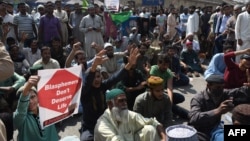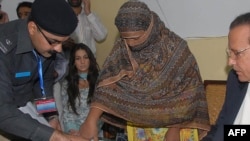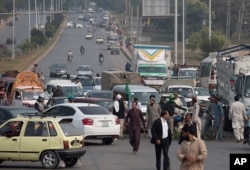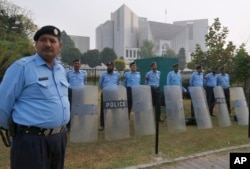Pakistan’s Supreme Court Wednesday overturned the conviction of a Christian woman on a charge of committing blasphemy, a crime punishable by death under Pakistani law. The landmark ruling sparked protests by hard-line Islamists and raised fears of violence.
“[T]he prosecution has categorically failed to prove its case beyond a reasonable doubt,” read the verdict in the case of Asia Bibi.
"I can't believe what I am hearing, will I go out now? Will they let me out, really?" Bibi, who has been in jail since she was first arrested in 2009, told AFP by phone from prison after the ruling.
Pakistan's Prime Minister Imran Khan warned what he called a handful of protesters across the country to "not take the state on" over the landmark Supreme Court verdict.
"I appeal to the people to not let these miscreants incite you at any cost. They are not serving Islam, they are hurting the country. They are using language that enemies use... only for their self serving politics," he said.
Several Islamist parties rejected the verdict. One of them, The Defense of Pakistan Council, announced it will now take matters in its own hands.
“Whoever gets a chance wherever should kill blasphemer Asia Bibi,” said their statement emailed to the media.
Security was tight in capital Islamabad where paramilitary forces were deployed to protect the Supreme Court and others sensitive areas. Security was beefed up for the judges following the announcement.
Flash mobs blocked traffic and had altercations with the police. In Islamabad and Lahore, protesters attacked media and police, smashing cameras and cars. In Pakistan’s commercial hub Karachi, protesters burned tires and blocked roads in various parts of the city.
In Lahore, Khadim Rizvi, the firebrand leader of Islamist group Tehreek-e-Labbaik Ya Rasoolullah (TLY), led a large group of protesters outside the provincial assembly building to protest the ruling. Addressing the crowd, another leader of the group, Pir Mohammad Afzal Qadri, issued an edict that all three Supreme Court judges who passed the verdict should be killed. The group also demanded the ouster of the newly elected government of Imran Khan.
Passengers traveling by bus between Lahore and Islamabad were stuck on the highway as various parts of it were blocked by groups of protesters. Police in various cities issues travel advisories, telling people which areas to avoid.
Bibi, a day laborer, was arrested after a dispute with women with whom she was picking berries.
According to her statement in court, she had a heated argument with the women after they refused to drink water she had fetched for them because she was a Christian.
Several days later, a man, Qari Muhammad Salaam, lodged a complaint with the police, claiming Bibi had used derogatory language for the prophet of Islam in front of the other women. In 2010, a trial court convicted and sentenced her to death. She has been in jail as her case went through various phases of appeal.
"The verdict has shown that the poor, the minorities and the lowest segments of society can get justice in this country despite its shortcomings," Bibi's lawyer Saif-ul-Mulook told AFP.
Blasphemy is a sensitive issue in Pakistan where people have been killed by individuals or lynched by mobs over a mere accusation.
Two years after Bibi’s arrest, a security guard killed the powerful and politically influential governor of Punjab province, Salman Taseer, who was trying to get amnesty for Bibi. A few months later, Shahbaz Bhatti, the minister for minorities, was killed for lobbying for a change in the country’s blasphemy laws, which are widely believed to be often misused to settle disputes.
In early 2017, an angry mob killed a student Mashaal Khan of a university in Mardan over accusations of blasphemy and dragged his body around campus.
The mainstream television channels in Pakistan avoided covering the protests and moved on to other news after announcing the court’s verdict.
Human rights activists hailed the verdict and demanded state protection for Asia Bibi, her family, and supporters.
“Justice had prevailed,” said Tahira Abdullah, an Islamabad based human rights activist.







